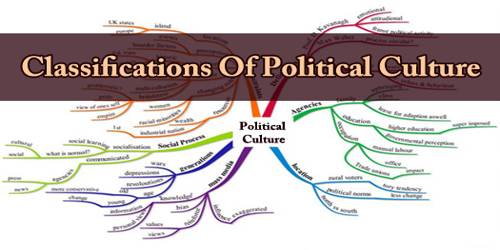To study the composition of political cultures, it is necessary to classify citizens according to a theoretical typology of political subcultures. Different methods of classification have been used for confronting this challenge, but the choice of method is rarely discussed in any detail because most studies apply a method without considering implications or possible alternatives. This is unfortunate because the choice of method has important consequences for the ensuing results.
Actually, the term ‘Political Culture’ is used in the field of social science. It refers to historically-based, widely-shared beliefs, feelings, and values about the nature of political systems, which can serve as a link between citizens and government.
Different countries have different political cultures, which can help us understand how and why their governments are organized in a certain way, why democracies succeed or fail, or why some countries still have monarchies. Understanding our own political culture can also provide clues to political relationships, such as those we share with each other or our governments.
However, it’s important to understand that political culture differs from political ideology. The term ‘political ideology’ refers to a code of beliefs or views about governments and politics that may influence the way we vote or whether or not we support certain legislative actions.
It has also been observed that the political culture of one country fundamentally differs from other countries. There is no country in the world to-day which can boast of single uniform political culture. Almond and Verba have listed four ideal types of political culture.
They are:
- Parochial Political Culture: Where the people have no understanding of ‘he national political system, do not possess any tendency to participate in the input processes and have no consciousness of the output processes, such a type of political culture is called parochial political culture. African tribes and Eskimos fall in this category. Such types of people have no role to play in political culture.
- Subject political Culture: This type of political culture is found in the subject countries and monarchies. There the people are aware of the governmental system whether they like it or not. They also know the role of the government regarding lawmaking, enforcement of laws and tax collection, etc. In this type of culture, people are not taught to participate in input functions. Sometimes they are not allowed to do so, so the people find it difficult how to influence the working of the political system,
- Participant political Culture: In this type of political culture people ore quite keen to participate in the political system and influence it’s working. They are always busy making reasonable demands on the political system and are involved in the making of decisions. They develop a particular attitude towards the political system. Political parties and pressure groups (interest groups) fall in this category and decide for themselves what role they can play.
- Political Sub-culture: It is not necessary that all the groups inhabiting a particular country may be equally advanced; some may be more advanced, while others may be less advanced. Therefore those groups who are more advanced, develop a participatory culture while others may still retain subject or parochial-culture. This is due to the reason that in many countries of the world there are different ethnic groups. Differences in political culture amongst them develop due to the difference in education, political training, economic and social background.
Therefore the backward develop a political sub-culture of their own. Sub-culture also develops when the political system is unable to advance rapidly according to the fast-changing needs of the society, Sometimes new political structures may be introduced by the elite but certain people may not be able to cope with it.
In this way, different sections of society may have different political orientations. So when a particular section of the society is clearly distinguishable from others in the same political system, then we find that it has developed a distinct political sub-culture of its own, France is the classic example of such sub-cultures.
In 1963, two political scientists, Gabriel Almond and Sydney Verba published a study of the political cultures associated with five democratic countries: Germany, Italy, Mexico, the United Kingdom, and the United States. Gabriel Almond and Sidney Verba in The Civic Culture outlined three pure types of a political culture based on level and type of political participation and the nature of people’s attitudes toward politics:
- Parochial – Where citizens are only remotely aware of the presence of central government and live their lives near enough regardless of the decisions taken by the state, distant and unaware of political phenomena. They have neither knowledge nor interest in politics. This type of political culture is in general congruent with a traditional political structure.
- Subject – Where citizens are aware of the central government and are heavily subjected to its decisions with little scope for dissent. The individual is aware of politics, its actors, and institutions. It is effectively oriented towards politics, yet it is on the “downward flow” side of politics. In general congruent with a centralized authoritarian structure.
- Participant – Citizens are able to influence the government in various ways and they are affected by it. The individual is oriented toward the system as a whole, to both the political and administrative structures and processes (to both the input and output aspects). In general congruent with a democratic political structure.
Almond and Verba wrote that these types of political culture can combine to create the civic culture, which mixes the best elements of each.
Generally, the various groups do not make the same effective contribution in a political system but in times of grave national crisis, they do so. In developing countries also political sub-cultures develop because of the differences of language, religion, class, and caste.
Information Sources:
















